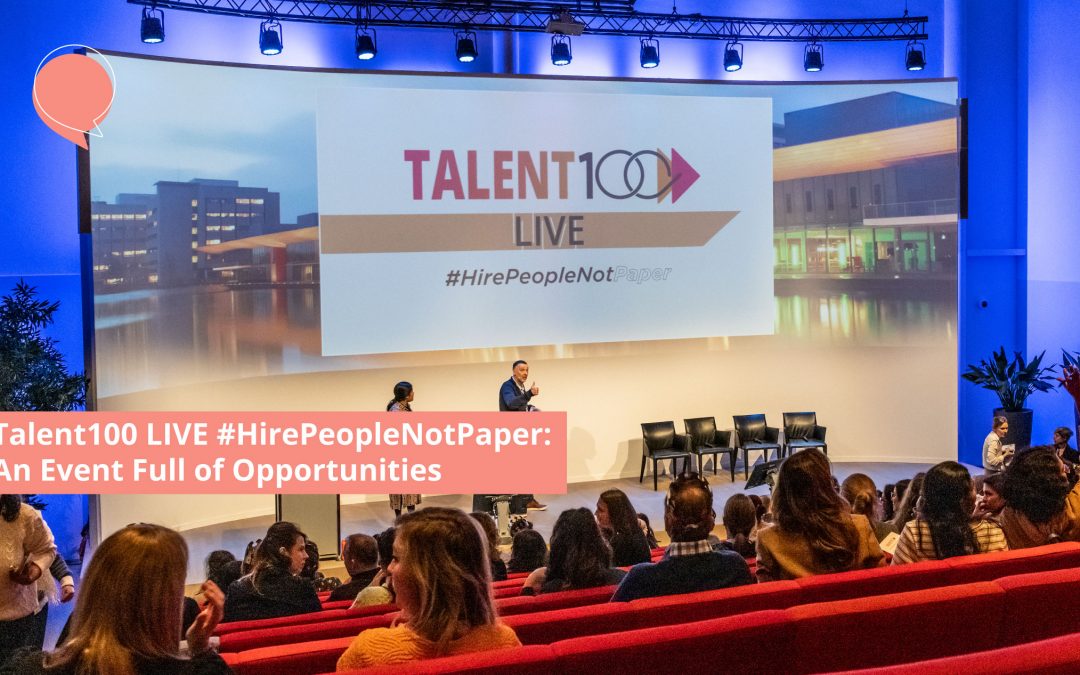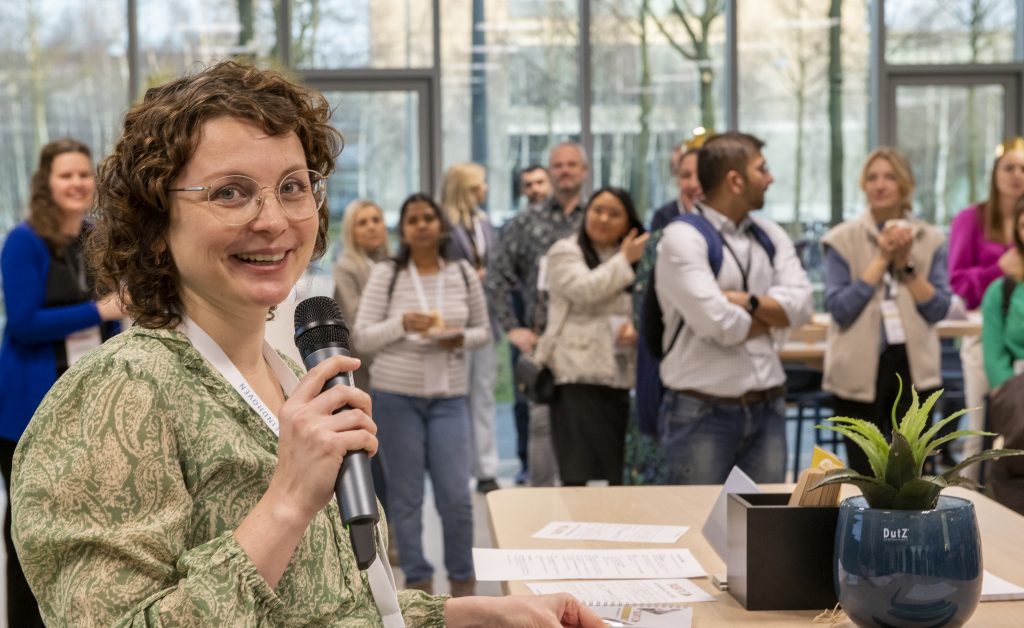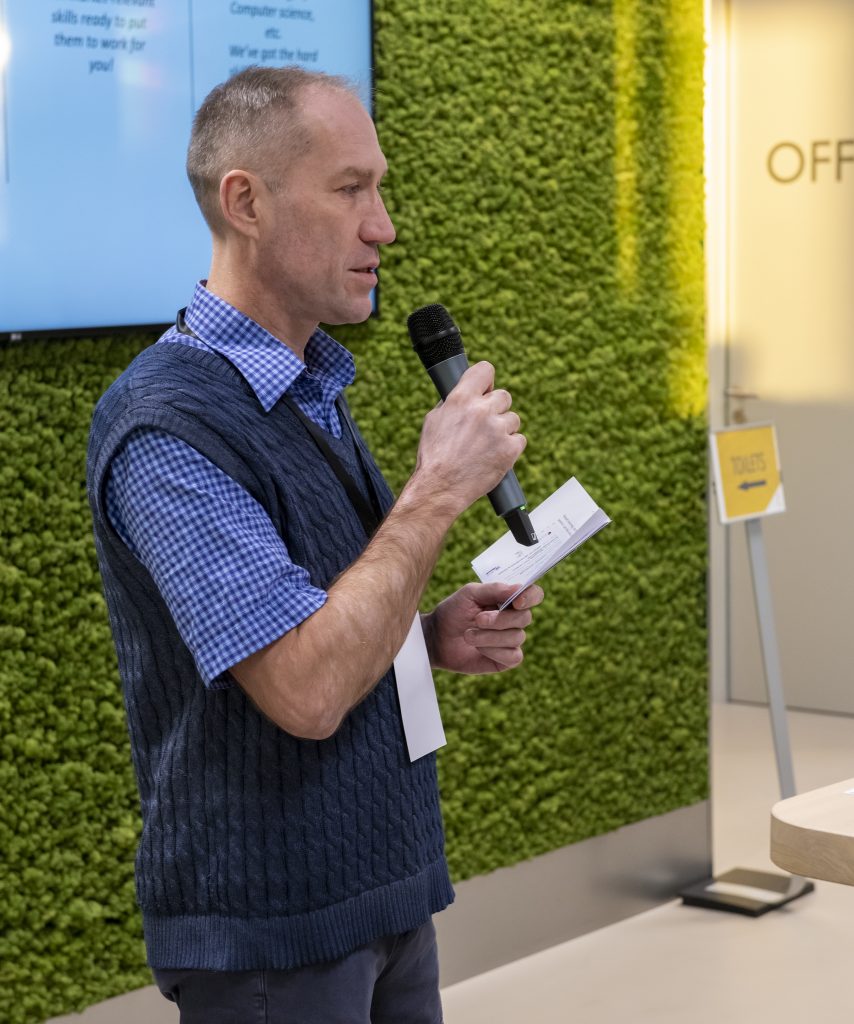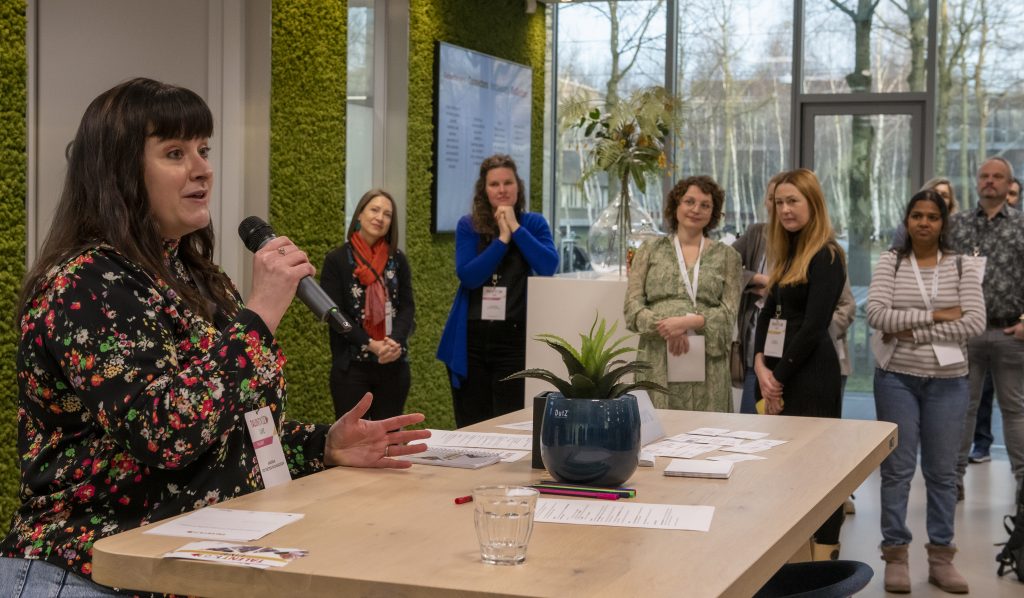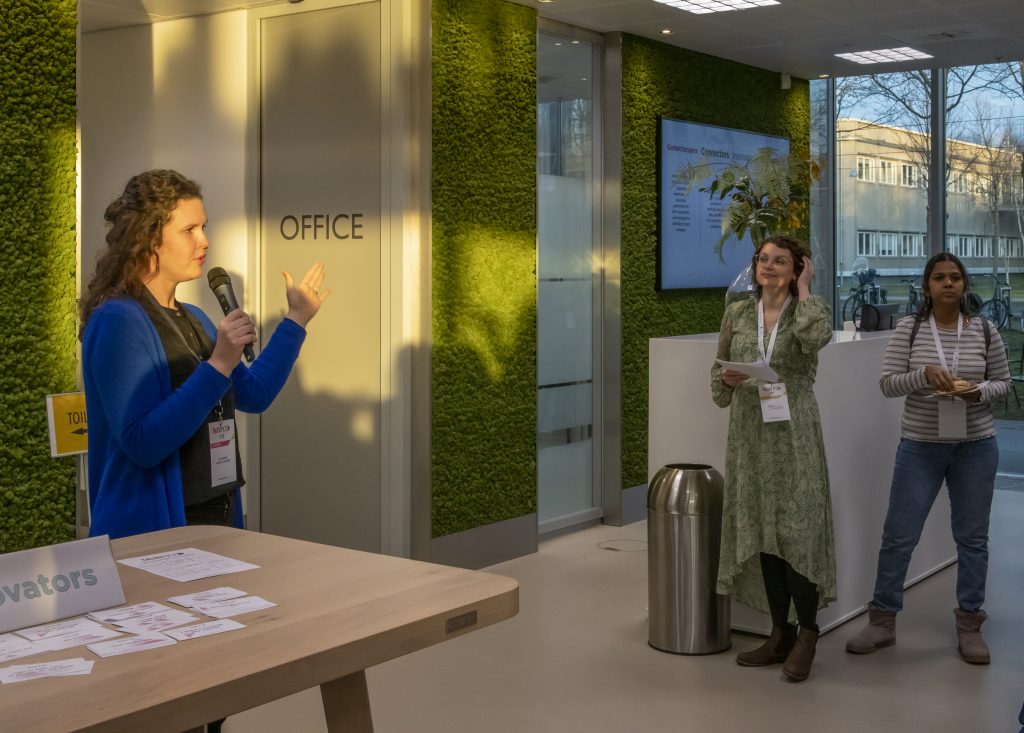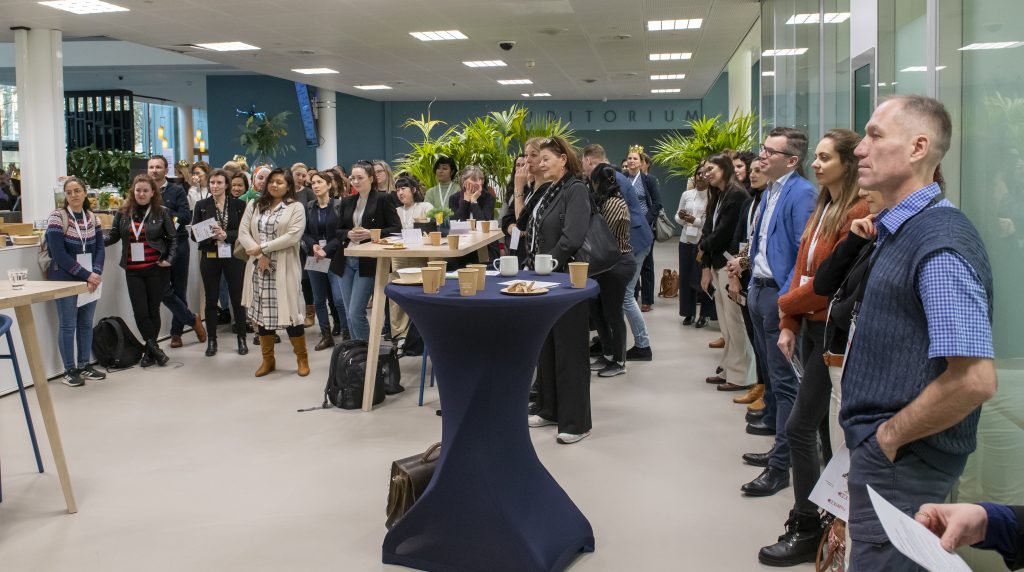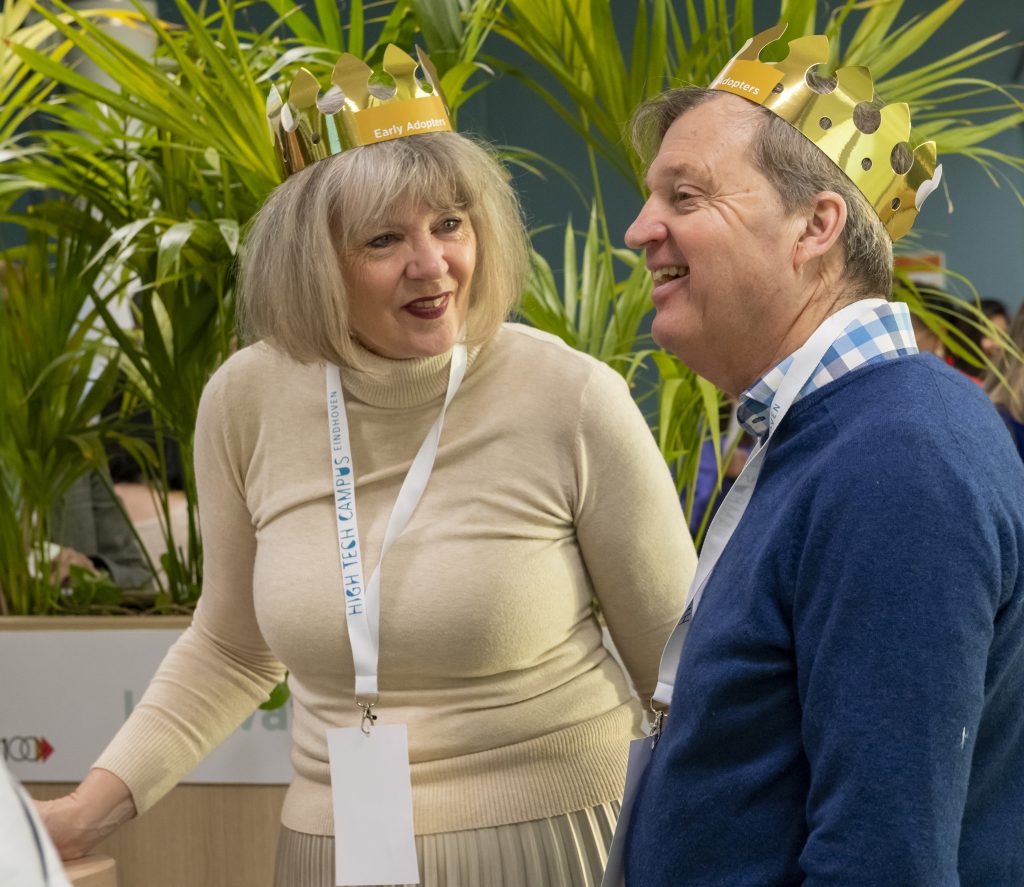March 2023 | Written by – Ariel Slaughter
The closing breakfast event for edition 2 of the Talent100 program, Talent100 LIVE #HirePeopleNotPaper, was a resounding triumph. Hosted by the Expat Spouses Initiative (ESI) and sponsored by the Living In program of Holland Expat Center South (HECS), the event gathered 100+ talents from Talent100 editions 1 and 2, companies, recruitment professionals, politicians, and other like-minded individuals to network, collaborate, and collectively discuss the pivotal question that lay at the event’s heart: How can recruitment be transformed to focus on skills rather than a Talent’s credentials on paper i.e., their CVs?
Find Your Next Hire Over Breakfast
The first step towards answering that question lay in finding and engaging talent – which was exactly how the event kicked off. After registration, attendees could mingle over cups of coffee and grab nibbles from the ample breakfast buffet in the foyer of the Conference Center at High Tech Campus Eindhoven before a brief introduction and four Talent100 spotlights from Edition II.
Talents Alexander Ledovskikh, a scientific researcher in chemistry and physics; Eleanor Mazzini, a creative project manager, and visual artist; Ljuba Naminova, an editor and journalist; and Andrea Potgieter Richardson, an intelligence analyst each shared their professional journeys, their passions as well as the employment opportunities they’re searching for. More networking followed with an activity, where our royalty for the day (HR and recruitment professionals) wore crowns as they connected with Talents divided into four different groups: Connectors, Game Changers, Go-getters, and Innovators. Each group represents how close its members are to the Dutch labour market.
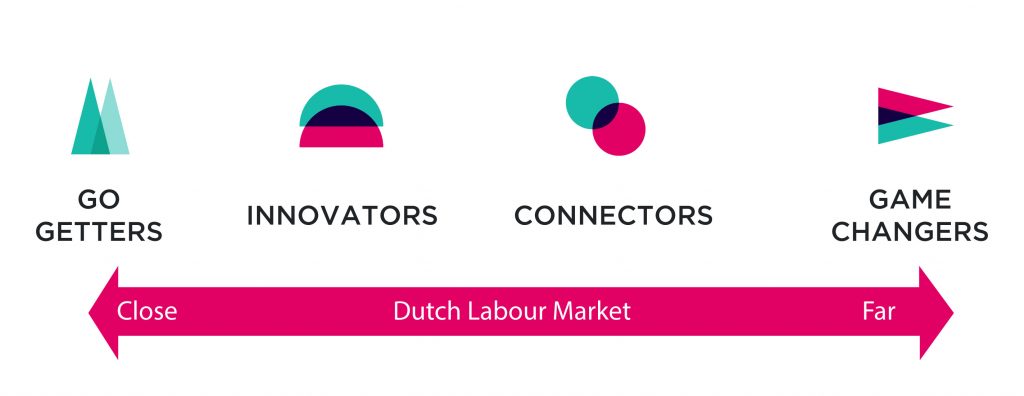
The networking activity put everyone in the mood to talk, but those conversations were put on hold as attendees moved to the auditorium to continue with presentations, a panel discussion, and seven company spotlights.
Locally Available and Highly Educated Talent with Talent100
Over the last 6+ years, the Expat Spouses Initiative has worked to highlight the importance of dual-career families, holistic onboarding practices, and viewing spouses as opportunities since they are usually highly educated, experienced, and have skills that can immediately contribute to the economic prosperity of the region.
The Talent100 program is the culmination of that work. It is a 12-week career re-entry program specifically designed to connect local international talents to the demands of the Dutch labour market. The goal of the program is to take 100 unemployed professionals a year and empower them through a variety of skill-building and informative workshops to help them return to work, either by reintegrating into their previous career or a different one.
Talents exit the program with increased knowledge of the local labour market and improved application materials and a greater understanding of the hiring process in the Netherlands, all of which help them find meaningful employment. In fact, 69% of Talents from Edition 1 found jobs within 6 months of the programs end. That number was 90% for Women for Women Talents (a particular track within Talent100) from Edition 1. The numbers for Edition 2 are still in progress but so far the results are impressive with 64% of Women for Women Talents having already found jobs before the program ended.
Diversify with Local International Talent
TALENT100 LIVE #HirePeopleNotPaper is a strong reminder of why the Expat Spouses Initiative is so important. While great progress has been made there is still more to do, and we need all early adopters to continue to rally around and support further actions that can help build inclusive workspaces. Ed Heerschap (Coordinator at Holland Expat Center South) and Kavitha Varathan (Founder of the Expat Spouses Initiative) introduced a few early-adopter moves that those present could use to further their talent engagement beyond today:
- Say yes to a “no pressure, think only opportunity cup of coffee.”
- Say yes in spite of the language barrier.
Ed elaborated, “What we need, and you can see it more and more is that employer recognize the talent and takes it from there. So, you can take more responsibility and ownership as a company to make a talent role fit. But you have to recognize the talent first.”
- Say yes to open hiring. “Set up a process to react so when there’s a really great talent comes along” that may not fit into an available role immediately.
They urged employers to reset for relevance with innovative recruitment strategies to be able to respond to the tight labour market, which Jessie Vossen, a labour market advisor with the UWV, explained next in depth.
The Dutch Labour Market by the Numbers
According to the UWV, there are currently 10 million people, consisting of both employed and unemployed, who are active in the labour market in the Netherlands right now. This is an unpreceded amount of activity and was “achieved by more factors than population growth.”
However, despite the record number of people active in the labour market there are still a lot of vacancies. In Brabant alone, there are 20,000 vacancies! But this one number doesn’t adequately describe the situation until combined with the number of job seekers. Together these numbers reveal the tension in the labour market which can range from low to very tight. Brabant is experiencing a very tight labour market, meaning there are more jobs than candidates available to fill them. “In general the region of southeast Brabant is more tight than the Dutch average. And that has everything to do with the structure of the regional economy and a strong high-tech sector.”
So if there are more people active in the labour market than ever before and the labour market of southeast Brabant is very tight, what are the opportunities? Jessie advises companies, “to be creative” to find people looking for jobs. Most employers (87%) will respond by simply intensifying their recruitment efforts to fill vacancies while only 46% will hire someone who doesn’t fit all the job criteria and provide on-the-job training to boost skills.
The opportunities for job seekers are plenty. “My suggestion would be as a job seeker is to really invest in your skills. Because once an employer and employee can find each other using skill-based methods, more matches can be made in the labour market. And that helps a lot in this tight labour market.” Why? When surveyed by the UWV, companies stated that they “value skills and professional knowledge over diplomas and degrees and relevant working experience when they’re hiring people.” In addition, when asked what skills they’re looking for employers named ones that “more or less related to social behaviour and general knowledge.”
If the companies are predisposed to value skills over degrees what can be done on a political level to help incorporate the professional ambitions of international Talent in the region?
Panel Discussion: The Vision for the Future
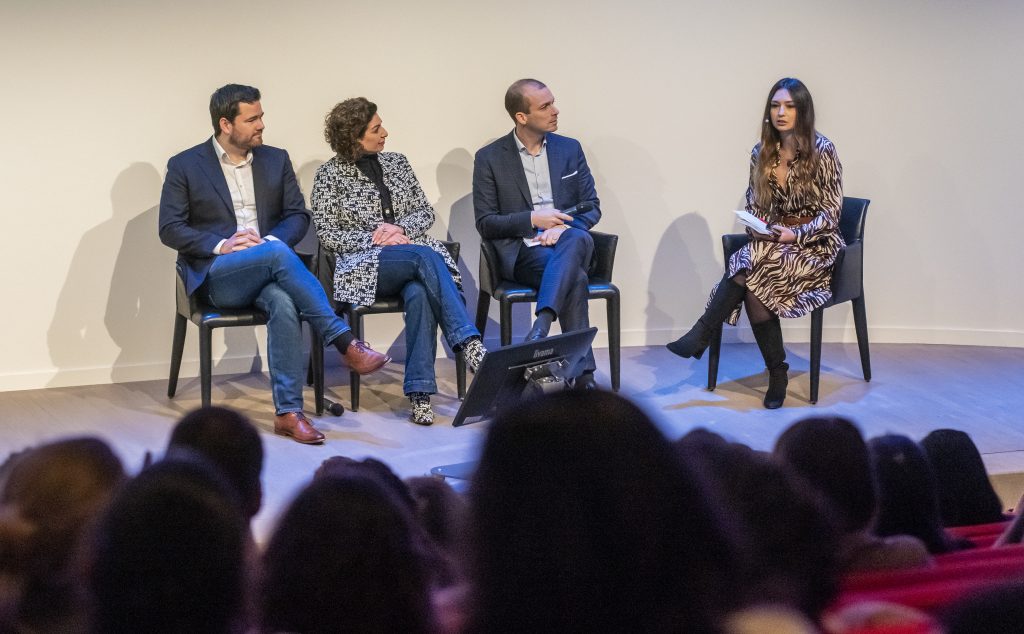
The members of the panel are very special because they include decision-makers who can directly influence projects such as Huis Naar Werk and the Talent100 program. Alderman Steenbakkers of Gemeente Eindhoven and Alderman Martijn de Korte of Gemeente Helmond; Zizi El-Ebtah of Huis Naar Werk, and moderator Alina Totti, a policy advisor for the Province of North Brabant sat down to discuss in depth the future of the region, their current challenges, and their plans to tackle them.
Like the labour market presentation, Alderman Steenbakkers stressed that indeed the region is in need of talent. “When I speak to companies, but also to decision-makers in The Hague, the biggest, biggest bottleneck and the growth for the Brainport region is talent. So, in the upcoming eight, nine years until 2030 or 2032, we need 72,000 thousand extra people.” Zizi who is in the business of “getting people to work” feels that the process of recruitment needs to be easier and more talent focused. “I think when you recognize talent and you connect with the employers, you get a match. It’s that easy. Projects like Talent100 have proven that.”
Throughout the event the word ‘creative’ was used repeatedly, but what does that really mean when it comes to talent and recruitment? Zizi explained, “Don’t look at the resumes and don’t look at the experience…[or] the education. I work with a lot of people who didn’t get the chance to be educated. And when I train them, I see their talents.” Alderman de Korte agreed:
“I recognize pretty much everything that was said here….If I look at the conversations I have with employers, I see the same as we all see. They’re looking for people. I also see that they do that by intensifying their recruitment oftentimes in ways that will never work because they just do more recruitment in the channels, they’ve already used…I also see that they’re still focused a lot on the resumes, and on the diplomas. And to be honest, I think that has never worked. But it definitely doesn’t work in such a tight labor market.”
The next big topic was funding. If projects like Huis Naar Werk, the Expat Spouse Initiative and the Living In Program are successful at training, reskilling, and retaining top international talent, how can they move from incidental to structural funding?
The problem with funding starts at the national level and tickles down according to Alderman Steenbakkers:
“We all fund with incidental money, all kinds of projects. Our municipalities are doing it. Our national government is doing it. And in the end, [that’s] fine when you kick-off or start up a project to see if it works, but you have to decide if the money will be structural because otherwise, you can’t build the program. I think a great example of that is the way we did it, like Living In program or the Expat Spouses Initiative…In March [we’re going to] the meet the cabinet [about the strategic agenda of Brainport] and now this is a topic to actually say ‘Guys, we’re very successful in that, you know, talent was the biggest bottleneck so please do not quit funding for Huis Naar Werk and those kinds of because it’s key in getting all Brainport economy growth happening.’”
Alderman de Korte agreed and shared what the Gemeente Helmond plans to do in the future regarding funding:
“We’ve said for now we’re going to focus on what we need to do structurally. If we do projects, it needs to be in this and this direction because this fits what we’re going to do structurally. So that means if there’s some money available that isn’t in there in that area, then we’re not going to commit to getting those funds. We’re going to keep the focus…And I hope that once the national government sees, ‘hey, there are more regions not jumping on the bandwagon when we splash some money, incidentally’, that hopefully helps them realize that this is not the way to fund a long-term good labour market structure.”
The panel ended with a final piece of advice for companies and talents:
For Companies
- Alderman de Korte: “The problem is the companies that aren’t here. So, for the companies that are here, I would like to ask you to tell at least one other company that you know isn’t here about this initiative…And if you ask them to do the same, then we’ll get there.”
- Zizi El-Ebtah: “Get in contact. There are many people in the community who [haven’t] attended the program. Ask Kavita and ask the team, to organize a meeting and…connect because I know there are many talents here who can get a job tomorrow.”
For Talent
- Alderman de Korte: “For those of you looking for a job. One piece of advice. Don’t give up. There’s definitely, definitely, definitely a place for your talent here.”
Company Spotlights
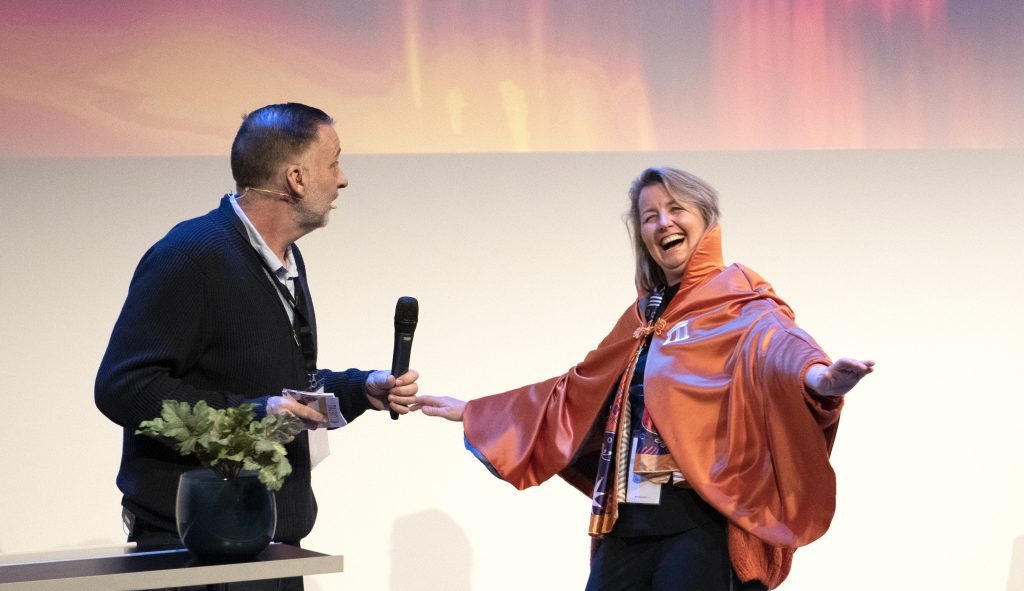
Next, several representatives from different regional companies were given the spotlight to tell the Talent present about themselves, their company, its culture, and their available vacancies. Attendees heard from Lisa Wouters, Director at Driessen; Thomas Weusten, EMEA Talent Acquisition Manager at Fluke; Natasja van der Velden, Executive Program Manager at Studyportals; Krista Polle, Teacher & Talent Coach at Fonty’s University of Applied Sciences; Beatrix Bos, Project Manager at Carbyon; Jaap Hoogveld, Manager recruitment, DAF; and finally Sanne Cuijten, Corporate Recruiter and Anne Dennemans, HR Business Partner at ICT Group.
The Answer
Throughout the event, many answers have been proposed to invigorate the recruitment process and move away from antiquated practices that offer little relief in the tight labour market. The most important answers were creativity and openness. To enable change, one needs to embrace openness and creativity to be willing to do things differently whether by exploring different recruitment channels or rethinking hiring criteria. It all comes down to the determination to be a trailblazer rather than a follower. And our initiative Including You presents those ready to go further together with that opportunity.
Become a Partner of Including You
In the words of Ed Heerschap, “Every serious event ends with a serious call to action.” In this case, the launch of The Expat Spouses Initiative’s new inclusion initiative, Including You. Kavitha explains:
“We have worked on the topic of accompanying partners and spouses, and internationalization for almost 8 years now and we know that it‘s a unique topic that doesn’t have enough traction yet, but it overlaps with recruitment, talent demand, talent need, HR from more than one perspective of engaging family and social responsibility…What we want to do with Including You is really connect from all those angles towards companies.”
There are already more than 10 companies signed up to be part of the initiative, which is at no cost. Partner organisations are those early adopters who want to fully engage in the topic of accompanying spouses to network, and collaborate to create opportunities for everyone to become professionally active and fulfilled in the Brainport region.
“[Partnership means] you could hire a spouse, you can support a spouse of your employee, or you can just support anyone from the community from diversity and inclusion or an SDG effort…It’s about sharing knowledge and experiences but also connecting with other early adopters more effectively.”
So, are you in? Sign-up now to become a partner of Including You.

